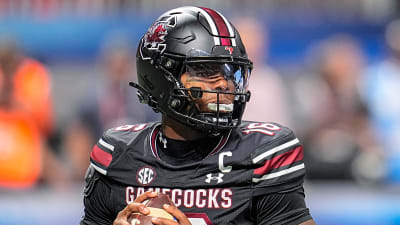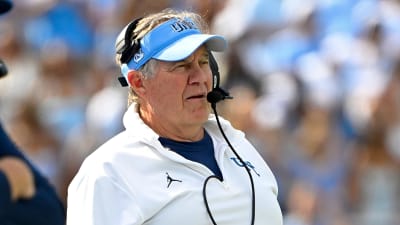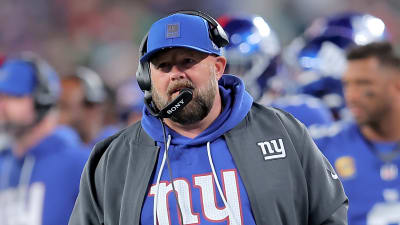
DALLAS — Oklahoma’s offensive line struggles could once again derail the season.
The Sooners were unable to generate any push in the running game, which heaped all the pressure on quarterback John Mateer against Texas.
Mateer wasn’t sharp early, and after OU fell behind, he had to try to grow into the game under massive amounts of pressure from the Longhorn defense.
His struggles continued, and Oklahoma left the Cotton Bowl with a 23-6 defeat after failing to score a touchdown for the third time in the four Red River battles under head coach Brent Venables.
Texas entered the weekend ranked 11th in rushing defense, while the Sooners ranked 96th in rushing yards per game.
The gulf in quality on the field was apparent.
OU rushed the ball 30 times for 48 yards, averaging 1.6 yards per carry after Mateer’s five sacks were subtracted from the rushing total.
“Obviously, we’re playing a really stout defense. We have to be better to win these games,” Venables said after the loss. “I thought they ran the ball very efficiently and were able to convert a lot of third-and-manageable situations because of some early down success. We weren’t able to do that consistently.”
Penalties played a factor, too.
Oklahoma’s best run of the day, a 33-yard rush by Mateer at the start of the fourth quarter that would have set the Sooners up in the red zone trailing 13-6 was negated by a holding penalty from tight end Carson Kent.
The next play, now a third-and-12, resulted in Mateer’s third interception.
“At the end of the day, we didn't do what winning requires today,” offensive coordinator Ben Arbuckle said. “We turned the ball over. We took some negative plays. We had self-inflicted wounds with penalties. We didn't do what winning required today.
“And that's on us as coaches. It's on us as players. That's on us as an entire unit that we got to watch the film, be accountable to and respond the right way.”
The struggles to run the ball weren’t just an issue against Texas.
OU did enough on the ground, mostly thanks to Mateer, to beat Michigan in Week 2. The Sooners also opened SEC play with a victory over Auburn, but that was despite only totaling 32 rushing yards.
Last year’s historically bad offense averaged 4.0 yards per carry and 155.2 yards per game.
This year, the Sooners are averaging 3.5 yards per carry and 122.3 rushing yards per game, and there aren’t any contests against defenses the caliber of Illinois State, Temple or Kent State left on the schedule.
Read More Oklahoma vs. Texas
- Brent Venables Explains Oklahoma's Defensive Collapse: 'I Let My Guys Down'
- How Oklahoma’s Players Plan to ‘Flush’ Loss to Texas in Red River Rivalry
- Oklahoma PFF Grade and Snap Counts for Sooners' Loss to Texas
“We were not detailed enough today in all three phases,” right guard Febechi Nwaiwu said after the loss. “It starts with me jumping off sides. I have to be better for the team and the o-line. We all have to feel this loss and learn from it.
“… I think it’s the same thing, details. Everybody being on the same page. I think we can all do better getting a push on the O-line. I think details and getting a push on the O-line.”
Things were made even more difficult at the end of the first quarter.
Right tackle Derek Simmons got rolled up on at the end of play, and with swing tackle Logan Howland out against Texas, the Sooners had to insert third-stringer Luke Baklenko into the game.
Venables said it was too early to have an update on Simmons after the loss, but offensive line coach Bill Bedenbaugh may be forced into another lineup change on Saturday against South Carolina if the injury to Simmons costs him further game time.
If the Sooners are unable to find any success on the ground, the full weight of the offense will remain on Mateer’s shoulders.
Heaping that much pressure on one player isn’t generally a recipe for sustained success in the SEC — especially as Mateer works his way fully back up to speed after missing time with his hand injury.
“The ability to run the football,” said Venables, “when it is all said and done, you have to be able to do that consistently to win.”
More must-reads:
- Predicting top 2026 NFL Draft QBs becoming a futile exercise
- Ohio State commit Jamier Brown sues Ohio High School Athletic Association over ban on NIL earnings
- The '2024 TD catch leaders by team' quiz
Breaking News
Trending News
Customize Your Newsletter
 +
+
Get the latest news and rumors, customized to your favorite sports and teams. Emailed daily. Always free!








